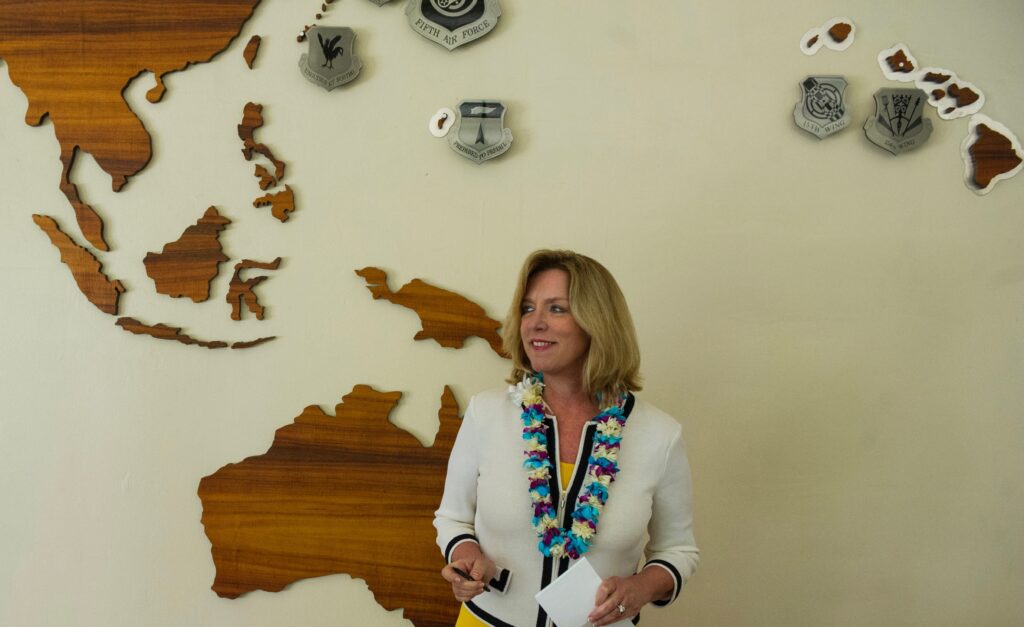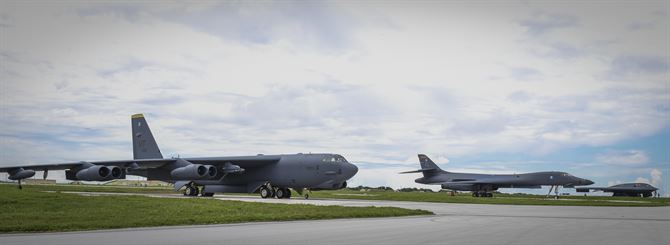SecAF James: Lessons From The Pacific
Posted on

Deborah Lee James
Air Force Secretary Deborah Lee James traveled through Asia, visiting Indonesia, India, Singapore, and the Philippines at the end of the summer. We didn’t hear a great deal about the trip in the US at the time but her meetings with her defense counterparts clearly impressed. In this op-ed, James shares the lessons she learned. China shaped much of what was discussed. Read on. The Editor.
The largest takeaway from my journey: The future is here and our friends are counting on us.
In particular, our friends hunger for closer ties with the American military branch I lead, the Air Force. They want more joint training, more technology transfers, more exposure to the globe-spanning capabilities of our B-1 bombers and our C-17 cargo planes. Those twin bookends of hard and soft power illuminate the relationships our partners crave as Asian economies boom and the region becomes more crowded with commercial and military traffic.
During my time crisscrossing the Asia-Pacific region, I met with many of my defense counterparts in an attempt to understand their world views. From the Philippines to India to Japan, I wanted to know: What are they concerned about? How can we build tangible, measureable security for the region and its expanding economies and cultures?
The backdrop, of course, is an economically and militarily rising China and an enigmatic North Korean state which just conducted another destabilizing nuclear test. To those who live in the neighborhood, there is unanimous agreement that they’d like the future to include continued freedom of navigation in the South China Sea and elsewhere; the rule of law to take hold in ongoing territorial disputes; and peaceful resolutions to long-standing conflicts such as where international boundaries begin and end.
The growing shadow of China’s military rise has raised concerns about its true intentions. A recent study by the RAND Corporation notes that China’s military might is expanding rapidly and in a relatively short time that burgeoning economic power will achieve near parity with the United States under several scenarios, including conflict in Taiwan Straits. The report noted the Chinese military’s steady efforts in building long-range missiles and other systems that could threaten U.S. interests.

B-52, B-1 and B-2 at Guam in August 2016
One inescapable fact is that many Pacific nations see airpower as an affordable deterrent and wish to establish richer ties with the U.S. Air Force in the realms of training, basing and upgrading technology. A similar dynamic has taken root in the Middle East, where many allies and partners are key members of the coalition fighting ISIL in Iraq and Syria. In recent years, these military-to-military relationships with air partners in the Gulf have paid enormous dividends as the coalition tightens the noose around ISIL’s ever-shrinking “caliphate.” The future in the Pacific could mirror those military-to-military trend lines, in part because air forces are relatively affordable to build and maintain and essential when weighed against the tyranny of distance that defines the Pacific region.
Recently, for the first time ever, the Air Force deployed B-1, B-52 and B-2 bombers to Asia to demonstrate our commitment to regional security. While others can debate the efficacy of “bomber diplomacy,” our allies communicated clearly to me that they want more demonstrations of solidarity going forward. Our task will be figuring how to do this smartly at a time when my service is stretched thin in Southwest Asia and elsewhere, while still demonstrating American resolve in the face of an uncertain world.
Deborah Lee James is Air Force Secretary.
Subscribe to our newsletter
Promotions, new products and sales. Directly to your inbox.
